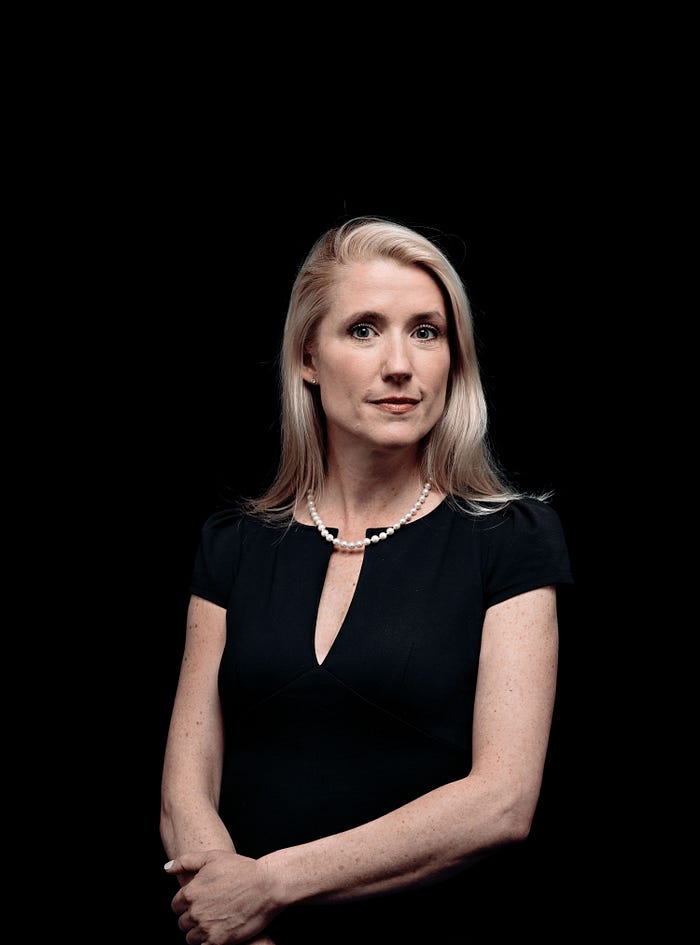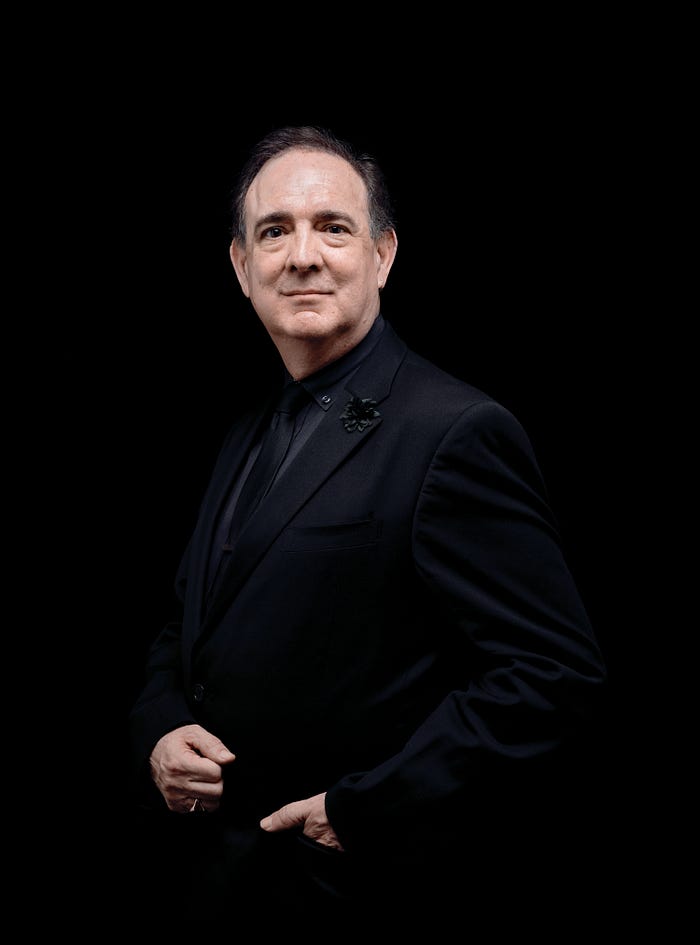The Texas Ten 2018
Photographs by Matt Wright-Steel
Since 2011, the Alcalde has honored UT professors with the Texas 10 awards. Every year, we ask alumni to nominate their favorite professor from their time on the Forty Acres, and every year, we are blown away by the response. Nearly 300 alumni and students nominated more than 100 UT educators, past and present, who inspired them. For some, that meant the engineering professor who sparked a passion that spawned a career. For others, it was the accounting professor who always kept their office door open, or the history professor who was so animated, one student said they dreamt of going back to school “just to sit in more of his classes!” For everyone, it’s clear — these are 10 unforgettable teachers.

Lisa B. Thompson
Associate Professor, African and African Diaspora Studies
Years at UT: 5
Write Anywhere: “I got over the whole: ‘It has to be quiet, the pencils are all lined up.’ No. If you’ve got 15 minutes, you can write.”
As a first-generation college student, Lisa B. Thompson was initially wary of pursuing a career as a creative writer. Then in graduate school at Stanford, her playwriting professor asked her to join a playwriting group in San Francisco. She was finishing up her doctoral exams when members of the group asked her to be part of a reading series. “I was like no, no, I can’t be doing this silly stuff,” Thompson says. Finally, they convinced her. After the reading of her play, a producer in the audience approached her and said, “I want it for next season.”
Since then, that play, Single Black Female, has run off-Broadway and around the world. “I tell my students all the time,” Thompson says, “‘don’t do things for money. Do things for your heart and money will follow. You can’t really hide from what your destiny is.’”
In her class titled “Revolution Will Be Dramatized,” her students studied plays and films that pushed for black rights during civil rights and the Black Power movement. Students created documentaries, graphic novels, paintings, and performances around Black Lives Matter, or any social movement important to them. “It was amazing to see what they came up with,” she says.
Her writing and teaching keep her busy, but Thompson is naturally energetic, especially when she’s doing what she loves. “I get paid to do this: talk about books and films and plays and poetry with people who are smart and excited,” she says. “I just have a lot of fun teaching.” — Marisa Charpentier

Bonnie Elliott
Clinical Assistant Professor, Department of Curriculum and Instruction
Years at UT: 19
Wanderlust: “I love to travel. I’ve never been anywhere in Italy I didn’t love.”
A large bookcase featuring colorful spines leans against one wall of Bonnie Elliott’s office in the George I. Sanchez Building. A pile of them is stacked on her desk. But these books aren’t weighty academic volumes; most are children’s books. And the eight shelves she has here don’t even contain the majority of her collection, she says. The rest are at Galindo Elementary, where she spends much of her time.
As an education professor, Elliott, PhD ’99, has her students do a lot of fieldwork. For the past 16 years, she has partnered with Galindo, a school where almost 90 percent of students come from economically disadvantaged backgrounds, so her students can interact with elementary schoolers and observe teachers leading lessons.
Her goal has always been helping her students find their own agency, so they can then pass that along to their students. “The key is helping them find their own voice, their own way of doing things,” Elliott says.
Elliott knew she wanted to be a teacher from a young age. While babysitting as a middle schooler, she would set up a school on her back porch. It wasn’t long before she started hijacking her mom’s vacation Bible school class, leading the lessons herself. Elliott received her undergraduate and master’s of education degrees from Harding University before teaching in public school for 12 years. Then, she realized by becoming a teacher of teachers, she could have an impact on more children.
She started working toward her PhD in curriculum and instruction from UT in 1991 and hasn’t left since. When it comes to her students, she wants to see passion. Fortunately, she finds it often. “In every single cohort I have passionate students,” she says. “You see them with kids and they’re glowing.”
Almost every year, a former student of hers is recognized as a “teacher of promise” in their school, news that motivates Elliott to keep teaching. “When I go out and see my amazing students teaching their students,” she says, “that truly does keep me going in ways that some other professions don’t get.”—M.C.

Carlos Torres-Verdin
Professor, Petroleum and Geosystems Engineering
Years at UT: 18
Dream student: “The student who teaches me and shows me new ways of thinking, who goes very deep into paths that nobody thought existed.”
By day, he teaches students, performs fieldwork in the oil and gas industry, and conducts research in the laboratory. But outside of the classroom, petroleum engineering professor Carlos Torres-Verdin, MS ’85, can be found running trails in the Texas Hill Country with his dog Cosmo, propagating madrones, and relaxing in his home, “The House of Sun and Water,” which is run entirely on energy from 32 solar panels and rainwater.
Despite the nature of his work, he lives an eco-friendly life with his wife, a plant biologist and a conservation ecologist. And even though his schedule is increasingly busy, he makes time for running, a ritual he started in the hills of Mexico as a kid. Since then, he has completed 20 marathons and over 400 half-marathons.
“Many of my best ideas have come through my running,” he says. “My brain has a tendency to get stuck in something and the only way to get it unstuck is by forcing the system to do something completely different.”
Torres-Verdin’s arrival at UT was in part due to a climbing accident he suffered in Mexico. While hospitalized for three months, he missed the entrance deadline for a physics program and instead signed up for geophysical engineering. After several years working in the industry and a two-year stint in Argentina, his calling for research drew him to UT, where he completed his master’s degree in electrical and computer engineering in 1985. Years later, he returned to UT to pursue his other passion: teaching.
As an instructor, Torres-Verdin says he never tries to reproduce his thinking in his students. Instead, he aims to facilitate their learning and serve as a guide, providing them with the tools they need to forge their own paths. “When you empower students, specifically through research, the student begins to teach you,” he says. “You begin by leading them, but at some point there is a magical moment where the roles switch [and] the student begins to lead the professor.” — Elizabeth Hlavinka

Fatima Fakhreddine
Distinguished Senior Lecturer, Chemistry
Years at UT: 19
Mother knows best: “Being a mother always has influence on me being a teacher. If I’m really mad at you, it’s because I care about you. It’s because there are things that you’re doing that are not right or there are things that you are not doing that you should be doing.”
Growing up in Lebanon, Fatima Fakhreddine, MA ’96, PhD ’99, had every intention of attending pharmacy school. But in the early 1980s, Lebanon was in the midst of a civil war, and the only university where she could complete a pharmacy degree wasn’t in a safe area. She decided to pursue chemistry, thinking she could transfer if things smoothed over. But then: “I fell in love with it,” she says.
After completing her undergrad, she and her family moved to Germany for a while, before her father-in-law, who was a U.S. citizen, was able to apply for them to come to the U.S. Fakhreddine received her master’s degree in organic chemistry and PhD in chemistry education from UT. She taught her first class — organic and biochemistry for nursing students — in 1999, and has been here ever since.
Fakhreddine quickly learned that many of the nursing students she was teaching weren’t interested in chemistry. To them, the course was just another box to check. “I felt that I could make a difference by showing them how chemistry relates to their lives,” she says.
This method laid the foundation for her teaching style. If her students aren’t truly learning the material, she doesn’t feel like she is teaching. “When I see that their minds are not really interacting with what I’m saying, that motivates me to try harder and find a different way to explain what I’m talking about,” she says.
For the past 17 years, Fakhreddine has taught general chemistry for Texas Interdisciplinary Plan students, or TIP scholars, freshmen who are strong students but require more individual attention. “Once they do well in their freshman year ,” Fakhreddine says, “they have built the confidence to do well later on.”
Getting regular emails from former students thanking her for helping them understand concepts that helped them later in life are her favorite moments as a professor. “I have a lot of times in the classroom where I feel I made a difference — a student was struggling and I was able to help him or her,” she says. “But this is the lasting thing.” — M.C.

Courtney Byrd
Associate Chair and Associate Professor, Communication Sciences and Disorders; Founding Director, Michael and Tami Lang Stuttering Institute
Years at UT: 14
Words to live by: “Life’s most persistent and urgent question is, ‘What are you doing for others?’” — Martin Luther King Jr.
Courtney Byrd likes to share a little-known fact about Winston Churchill with her students. Even though the British prime minister was one of the world’s most brilliant orators, he was a lifelong stutterer. Byrd has committed her life to studying stuttering, teaching its complexity to students, and reducing its stigmatization.
When she started in 2004, Byrd was the first at UT to specialize in stuttering, increasing the university’s engagement with the issue by leaps and bounds. Each year, the Michael and Tami Lang Institute, for which she serves as the founding director, provides treatment to people who stutter and their families. The institute also offers UT students the chance to participate firsthand in the provision of treatment and therapy programs.
Byrd can’t give enough credit to her students. “They’re the champions … they really motivate me,” she says. Over 1,000 undergraduate and graduate students have helped her with research and treatment. In return, she does whatever she can for them, offering mentorship and writing hundreds of letters of recommendation a year. Byrd’s mother didn’t finish college, and she spent her childhood caring for her siblings, eventually putting herself through school. She credits her education as the reason she has made it so far.
In the classroom, Byrd challenges her students and expects them to challenge her back. This means going to class every day “and feeling the heat of what’s expected,” she says. “I work as hard as I can to give that to them.” — Ryan Duffy

Thomas Garza
University Distinguished Teaching Associate Professor, Slavic and Eurasian Studies; Director, Texas Language Center and Arabic Flagship Program
Years at UT: 27
The world’s a stage: “Growing up, I wanted to be a stage actor. I sort of get to do that as a professor: three shows, two times a week!”
Studying Russian, Eastern Europe, and vampires was something Thomas Garza fell into by chance. But in a way, it felt like destiny.
His first office at UT was in the dingy, cramped underground of Parlin, where he worked alongside the resident bat colony. It was there he met his wife and associate professor of English, Elizabeth Richmond-Garza, and the couple became the two “quirkiest” characters in the basement.
Today, his office has a view, but a bat colony still lives a couple of floors above. Every inch of the space is covered in bookshelves, one for each class: “Vampire in Slavic Cultures,” “Bulgakov’s Master and Margarita,” and “Russian Sci-Fi in Lit and Film.” Sitting on the shelves are Vladmir Putin bobbleheads, dated postcards, and Edward Cullen candles. It’s hard not to notice Garza’s lecture-day outfit: an imitation leather blazer and a shimmering gold bowtie.
Since starting at UT, he has been awarded over a dozen administrative and leadership roles, but teaching is what he lives for. Each year, he says, his students are more diverse and open-minded, and continue to inspire him.
“I feel so lucky to see firsthand what people thought was going to be a disastrously apathetic generation prove us wrong,” he says. “The millennials have turned out to be [one of the most] incredibly politically aware, socially-conscious, caring population I’ve ever seen at my time here at UT.” — E.H.

Patricia Carter
Associate Professor, Nursing
Years at UT: 19
Dream student: “My favorite kind of student is one who thinks at the beginning of the class I’ve got nothing to teach them.”
Patricia Carter was only 10 years old when she took her first “job” in health care, as assistant activities director at the nursing home where her mother worked. Outfitted in a badge and tiny smock, Carter would write letters for the residents, read them stories, paint their nails, and take them back-and-forth to the music room. “I fell in love … and just never looked back from there,” she says of the (unpaid) gig.
Carter spent years as a practicing nurse, caring for patients that had advanced-stage cancer, but was drawn to the classroom and research because she wanted to keep learning. “I get bored really easily,” she laughs. Her students, she says, help her with that: “You’ve got to stay engaged, you’ve got to sell it, you’ve got to be on.” Her research in behavioral sleep medicine keeps her inquisitive, too. “[In] sleep science, everytime we answer one question, we create 1,500 more,” Carter says.
And while her research — helping those with insomnia sleep better — may seem worlds apart from her work as an educator, she feels it all falls under the same umbrella. She helps people reach their full potential, whether that’s an elderly patient with insomnia and a CPAP machine, or a first-generation student from the Rio Grande Valley navigating the sheer size of UT. Carter feels especially poised to take that role on, as she was the first person in her family to go to any sort of college, let alone graduate.
“I feel like it’s a gift to work every day with the quality of the students that come here,” Carter says. “In a way I sort of hold their lives in my hands, and that is at once both an awesome responsibility and an amazing gift that I never could have seen for myself.” — Sofia Sokolove

Bartholomew Sparrow
Professor, Government
Years at UT: 27
Classroom Pet Peeve: “Students who don’t use undergrad to take classes and do activities that might interest them, but might not be useful for their careers. The undergraduate years are a time of growing, to meet different people, try new things.”
Step into the office of government professor Bartholomew Sparrow, MA ’84, and you’ll find colorful pieces of abstract art painted by his wife, gifts from students strewn about his desk, and an entire wall adorned with hundreds of books — all of which he has read.
From Joan Didion’s Political Fictions to Max Weber’s Economy and Society to a volume of the Pentagon Papers, he’s been adding to this little library on the third floor of Batts Hall since starting at UT, nearly 30 years ago. It’s a collection as expansive as the subjects that drive him. With a focus on American political development, Sparrow has taught classes on the rethinking of America’s founding; bureaucracy; the media; the politics of food in America; and great American fiction.
“What I love about political science is it’s such a large field,” says the Annapolis, Maryland, native. “‘We’re political animals,’ as Aristotle says. We’re in society and there has to be a settling on how people are going to engage — the complexity is wonderful.”
A rebellious streak in his youth made Sparrow think he’d never be a professor like his father. He toyed with the idea of becoming an architect or cultural engineer and worked a brief stint in journalism before finding his voice in academia. When he’s not walking his dog Zonza or riding his bike around Austin, Sparrow is looking for a new way to engage his students, or working on his next book.
“I’m just happy reading and writing — if I’m on vacation for a week, I find myself wanting to go back to political science and studying,” he says. “That’s terrific. That’s what you really want: to enjoy your work.” — Danielle Lopez

Heidi Toprac
Senior Lecturer, Finance
Years at UT: 16
Overseas finance: Last year, for the first Maymester ever offered by McCombs, Toprac took 25 business students to Athens, Greece, and taught them Finance 357 abroad.
If you are one of the more than 20,000 undergraduate students Heidi Toprac, MBA ’91, Life Member, has taught in her 16 years at UT, you may remember a few things about her finance exams. One: they were challenging. Two: they were also sort of … fun?
“I always try to have a theme,” she explains of her often movie-centered tests. A complex math problem, for instance, might be full of large numbers to crunch — but also feature characters from Lord of the Rings. Like most things about Toprac’s class, the “fun” tests aren’t just a random quirk; it’s a method she has developed based on research that suggests if students distract themselves from their fears during an exam, they perform better. “So if I can help my students perform better and entertain myself at the same time, then why not have a Harry Potter exam?” she says.
After spending nearly 20 years in the corporate world at companies like Texas Instruments and Dell, Toprac makes sure her courses are relevant and authentic. Though she’s often teaching business finance, bringing in personal examples make the material more relevant.
In Toprac’s mind, imbuing her classes with the latest education research is also part of her responsibility. It’s why she heads to education conferences frequently and why a tall stack of pedagogy books sit in her office. “I like learning,” she says. “That motto on the main Tower, ‘Ye shall know the truth and the truth shall set you free,’ doesn’t mean only students who are enrolled and paying tuition should continuously seek the truth, but so should everyone.” — S.S.

Donna Johnston-Blair
Lecturer, Accounting
Years at UT: 5
Favorite Place on the Forty Acres: Her office, which is flanked by the offices of three friends, professors Gretchen Charrier, Jeff Johanns, and J. Kamas. “We have so much fun,” she says. “We’re loud.”
Growing up in Canada, Donna Johnston-Blair studied math and computer science as an undergrad at the University of Toronto before switching to French and eventually returning to earn an MBA. In between, she spent a year “goofing around,” she says, working as a tour guide of CN Tower, then the tallest building in Toronto.
In a way, she is an accountant by accident: she wasn’t sold on a specific career path, but one of her favorite business school classes was accounting. She decided to go for a CPA. In her MBA program, she was one of only a handful of women, and after graduating, she witnessed firsthand the difficulties of being a woman in the workplace. Some of her firm’s clients wouldn’t allow women on their job and she had few fellow female accountants. She says that she likes to bring these “war stories” to the classroom to motivate her students.
“Don’t be a defeatist. Problem solve,” she advises students when they get in a rut. When she has to deconstruct an esoteric tax concept or power through a dry accounting lesson, Johnston-Blair relies on a good sense of humor, analogies, and getting her students involved.
Johnston-Blair, who also works for a venture capitalist firm in Palo Alto, California, doesn’t see herself as above her students and likes to tells them: “It’s okay to make mistakes. I do sometimes, too. Yell at me when that happens … [because] in the real world, that’s going to happen.” — R.D.
